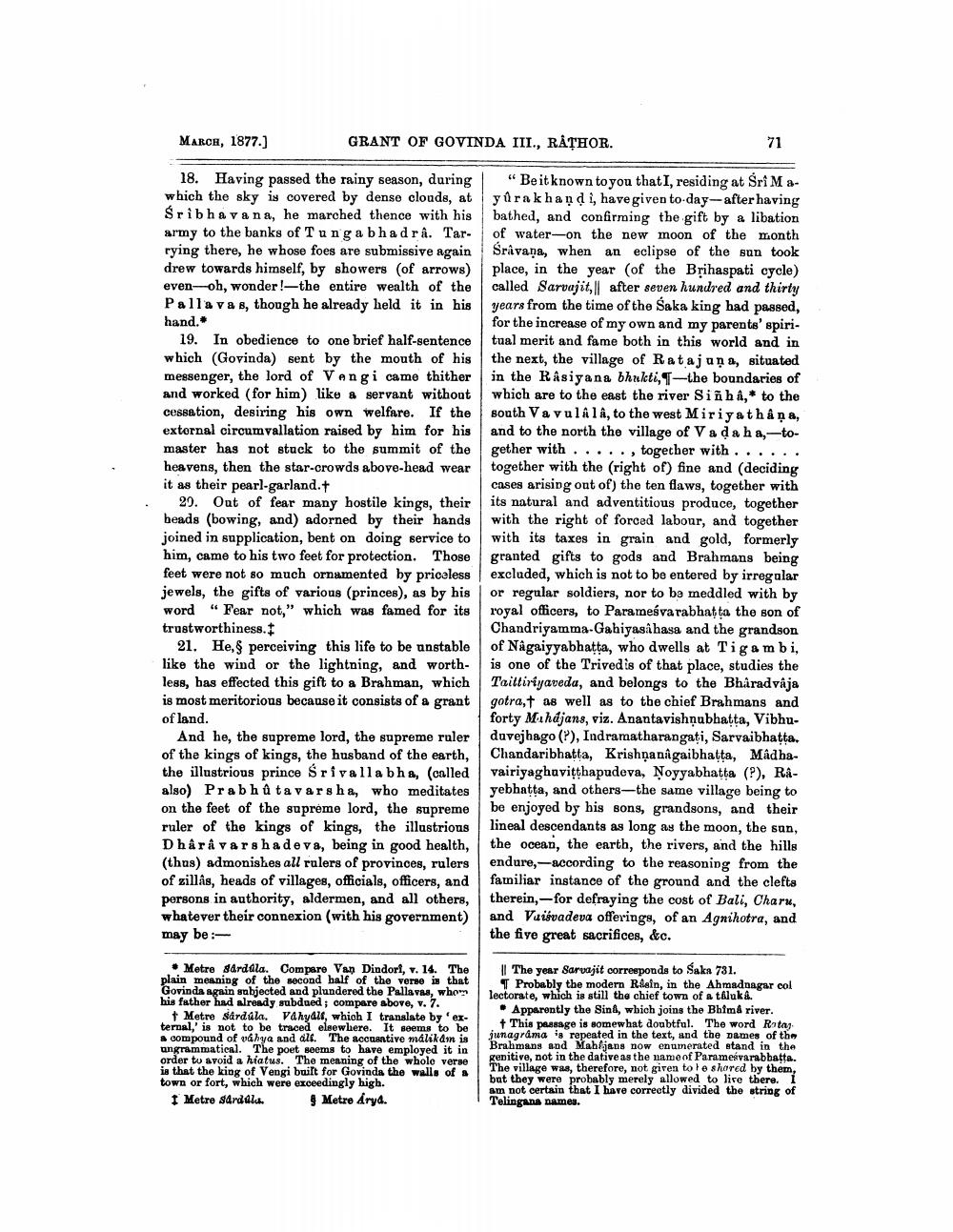________________
MARCR, 1877.)
GRANT OF GOVINDA III., RÅTHOR.
71
18. Having passed the rainy season, during which the sky is covered by dense clouds, at Śrîbhavana, he marched thence with his army to the banks of Tung abhadra. Tarrying there, he whose foes are submissive again drew towards himself, by showers (of arrows) even-oh, wonder!-the entire wealth of the Pallava 8, though he already held it in his hand.
19. In obedience to one brief half-sentence which (Govinda) sent by the mouth of his messenger, the lord of Vengi came thither and worked for him like a servant without cessation, desiring his own welfare. If the external circumvallation raised by him for his master has not stack to the summit of the heavens, then the star-crowds above-head wear it as their pearl-garland.+
20. Out of fear many hostile kings, their beads (bowing, and) adorned by their hands joined in supplication, bent on doing service to him, came to his two feet for protection. Those feet were not so much ornamented by priceless jewels, the gifts of various (princes), as by his word " Fear not," which was famed for its trustworthiness. I
21. He, perceiving this life to be unstable like the wind or the lightning, and worthless, bas effected this gift to a Brahman, which is most meritorious because it consists of a grant of land.
And he, the supreme lord, the supreme ruler of the kings of kings, the husband of the earth, the illustrious prince Srivallabha, (called also) Prabh û ta varsha, who meditates on the feet of the supreme lord, the supreme ruler of the kings of kings, the illustrious Dharivars hadeva, being in good health, (thus) admonishes all rulers of provinces, rulers of zillas, heads of villages, officials, officers, and persons in authority, aldermen, and all others, whatever their connexion (with his government) may be :
"Be it known to you that I, residing at Sri Mayurakhand i have given to-day-after having bathed, and confirming the gift by a libation of water--on the new moon of the month Sravana, when an eclipse of the sun took place, in the year of the Brihaspati cycle) called Sarvajit,ll after seven hundred and thirty years from the time of the Saka king had passed, for the increase of my own and my parents' spiritual merit and fame both in this world and in the next, the village of Ratajuņa, situated in the Rasiyana bhukti, T-the boundaries of which are to the east the river Siih A,* to the south Va vulAlâ, to the west Miriya thâņa, and to the north the village of Vada ha-together with ....., together with ...... together with the right of) fine and (deciding cases arising out of) the ten flaws, together with its natural and adventitious produce, together with the right of forced labour, and together with its taxes in grain and gold, formerly granted gifts to gods and Brahmans being excluded, which is not to be entered by irregular or regular soldiers, nor to be meddled with by royal officers, to Paramesvarabhatta the son of Chandriyamma-Gahiyasahasa and the grandson of Någaiyyabhatta, who dwells at Tiga mbi, is one of the Trivedis of that place, studies the Taittiriyaveda, and belongs to the Bharadvaja gotra,t as well as to the chief Brahmans and forty Mihájans, viz. Anantavishņubhatta, Vibhuduvejhago (P), Indramatharangati, Sarvaibhatta, Chandaribhatta, Krishộanagaibhatta, Madhavairiyaghavitthapudeva, Noyyabhatta (?), RAyebhatta, and others--the same village being to be enjoyed by his sons, grandsons, and their lineal descendants as long ay the moon, the sun, the ocean, the earth, the rivers, and the hills endure,-according to the reasoning from the familiar instance of the ground and the clefts therein,- for defraying the cost of Bali, Charu, and Vaišvadeva offerings, of an Agnihotra, and the five great sacrifices, &c.
Metre sardala. Compare Van Dindorf, v. 14. The plain meaning of the second half of the verse is that Govinda again subjected and plundered the Pallavas, whom his father had already subdued ; compare above, v. 7.
1 Metre sardala. Vahyal, which I translate by 'external,' is not to be traced elsewhere. It seems to be
compound of váhya and all. The accusative malikam is angrammatical. The poet seems to have employed it in order to avoid a hiatus. The meaning of the whole verse is that the king of Yengi built for Govinda the walls of a town or fort, which were exceedingly high.
I Metre sdrdluke Metre Arya.
| The year Sarvajit corresponds to Saka 731.
T Probably the modern Rasin, in the Ahmadnagar col lectorate, which is still the chief town of a taluk.
. Apparently the Sind, which joins the Bhima river.
+ This passage is somewhat doubtful. The word Rota. junagrama is repeated in the text, and the names of the Brahmans and Mahjans now enumerated stand in the genitive, not in the dative as the name of Parameávarabbatta. The village was, therefore, not given to be shared by them, but they were probably merely allowed to live there. I am not certain that I have correctly divided the string of Telingana names.




